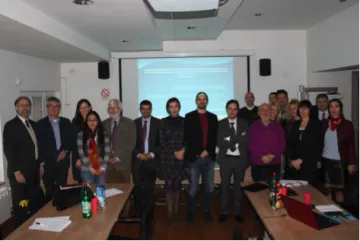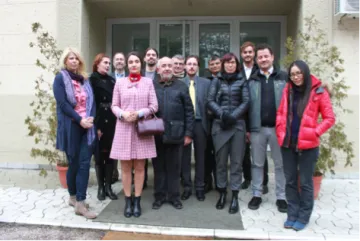Launching of South East European G-WADI Network and IDI expert group meeting ‘Data tools and methodologies to address floods and droughts in the Member States’
UNESCO IHP (International Hydrologic Programme), IDI (International Drought Initiative) and WSDAC organized a meeting from 17-18 December 2014 at WSDAC "Water for Sustainable Development and Adaptation to Climate Change" UNESCO category II centre hosted by the Institute for the Development of Water Resources "Jaroslav Černi" in Belgrade, Serbia. The meeting, attended by representatives and experts from the region, launched the Southeast European secretariat for the G-WADI Programme (Global Network on Water and Development Information in Arid Lands), as well as the identification of gaps and needs of the member states.


Numerous case studies from the Southeast European region, as well as worldwide, were presented to identify the gaps in data availability, tools and methodologies to address floods and droughts in member states. Furthermore, the need for a capacity building component was identified during the meeting. The meeting discussed products offered by the G-WADI network, linkages with the International Drought Initiatives (IDI) and possible joint activities.
Following the thematic discussions, the participants of the meeting , which included representatives from the following institutions:
- WSDAC,Belgrade, Serbia
- International Commission for the Protection of the Danube River (ICPDR)
- International Sava River Basin Commission (ISRBC)
- UNESCO/INWEB, Aristotle University of Thessaloniki, Greece
- National Meteorological Administration, Romania
- Slovenian Environmental Agency
- University of Ljubljana, Slovenia
- University of Belgrade, Faculty of Civil Engineering, Serbia
- Republic Hydrometeorological Service of Serbia (RHMSS)
came up with the Terms of Reference for the establishment of the G-WADI Secretariat for Southeastern Europe. The meeting decided to establish Southeastern European G-WADI members, which included the participants of the meeting.
MAJOR OUTCOMES OF THE MEETING
- WSDAC has become the G-WADI secretariat for SEE
- Regional experts have formed G-WADI SEE Advisory Group
- Major issues and gaps have been identified
FUTURE ACTIVITIES OF G-WADI SEE
- Create, host and maintain G-WADI SEE website
- Publish news and disseminate regional information
- Link with global G-WADI activities
- Raise awareness through brochures, workshops, conferences, etc.
- Build capacity through manuals, training and education
